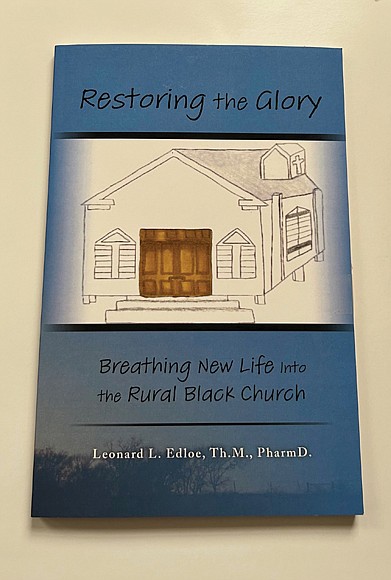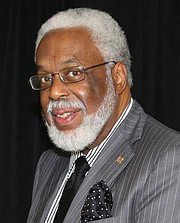Shining a light on the ‘Rural Black Church’
Debora Timms | 2/22/2024, 6 p.m.
Leonard L. Edloe, the founding pastor of Hartfield’s New Hope Fellowship Church, delves into the history and the legacy of the rural Black church in his recently self-published book, “Restoring the Glory: Breathing New Life into the Rural Black Church.”
His 110-page book also discusses the importance of the church’s role in the Black religious community and what the Richmond native sees as a crucial need to revitalize the institution to ensure its future, not only in Virginia but everywhere.
He spoke in a recent interview about the many reasons why the Black church, and especially the rural Black church, has been so important.
“The church was the only institution in our community that had power,” Dr. Edloe explained. “The power of just being organized and the power respected members of the church bring to the community. [The church] also filled many roles in the community.”
Historically, it was a place community members could come for spiritual guidance, but also practical assistance. New pastors fresh out of seminary were usually sent first to a rural church.
“The rural Black church still serves as a training ground for pastors,” he added.
Some of those pastors retain that connection even when they move to larger urban churches and continue to preach in small rural churches simultaneously.
“Many Black pastors are bi-vocational,” Dr. Edloe said. “Having two churches might fulfill that need.”
Leading a church is his second career as well. A graduate of Armstrong High School, he earned a degree in pharmacy which led him to own and operate several pharmacies in Richmond. He continues to work part time filling prescriptions.
“As Black people, we have the worst health outcomes in this nation,” Dr. Edloe noted. “When I worked on my doctorate in pharmacy at the University of Florida, my pharmaceutical care project was on ‘Health Outcomes in Two Rural Black Churches.’
When I owned my pharmacies, I provided flu shots at the church. We also held countywide health fairs. To me, they are one and the same — healing of the body and healing of the spirit.”
Dr. Edloe became a pastor in 1997 after earning a divinity degree from the Samuel DeWitt Proctor School of Theology at Virginia Union University.
“Restoring the Glory: Breathing New Life into the Rural Black Church” began as a thesis in the winter semester of 2017. It was part of Dr. Edloe’s graduate studies when he returned to school to pursue a master’s in theology at Union Presbyterian Seminary.
The late Dr. Katie Geneva Cannon, one of his professors and the first Black woman to be ordained in the Presbyterian church in the United States, told him he had a “good title for a thesis … and a good title for a book.”
As he wrote, finding sources about the history of rural Black churches proved difficult.
“Academically, there has been a disconnect too many times when it comes to the rural Black church,” Dr. Edloe said. “A lot of the history of rural churches has also been lost for numerous reasons. Church fires or fires in the homes of those who kept the records, along with not keeping good records as well.”
One of his first sources was the book “Dark Glory: A Picture of the Church among Negros in the Rural South,” written by one of Dr. Cannon’s professors, the theologian Harry V. Richardson.
Another was a pamphlet written by VUU’s first Black president, Dr. John M. Ellison Sr.
Wanting to provide an easily accessible history of the rural Black church also motivated Dr. Edloe to publish his work. He wanted to provide advice and guidance to seminarians leading a rural church.
“There needs to be a change in theology,” he said. “Many of our traditions came out of the white church and the patriarchy.”
Adding that it was important to “take a fresh look at everything,” his book offers suggestions for revitalizing the church, emphasizing innovation, adaptability and a renewed commitment to the church’s core values.
His book already is being used as a resource by the Fellowship for Clergy in Rural and Underserved Areas at Campbell University in North Carolina whose members come from several states.
“We need to keep the church in our communities,” he emphasized. “Once you lose the institution, it’s hard to get it back and it needs to be there.”








